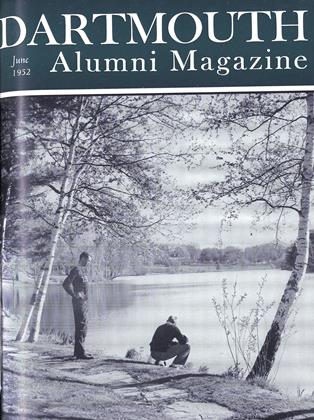BILL Corrigan '23 has kindly presented me with a copy of Bruce Catton's Glory Road (Doubleday). This is the type of story I revel in, dealing as it does with the Civil War, and etching with great skill some of its most decisive and interesting battles. Briefly, this book tells the story of the Army of the Potomac in the critical months between the autumn of 1862 and Gettysburg the following July. After two failures at Fredericksburg and Chancellorsville, this army on Little Round Top, in the Peach Orchard, and on Cemetery Ridge at Gettysburg broke the back of Southern chances for ultimate victory in three desperate days of fighting. The author has used letters, diaries, official records and other sources, and through the alembic of a fine historical sense has transformed them into fascinating reading.
This inevitably leads me to Bell I. Wiley's The Life of Billy Yank (Bobbs Merrill). It must have been at least three years ago when Bell Wiley appeared in Hanover with the blessing and introduction of Ben Ames Williams '10, author of the great Civil War novel House Divided, and looked through our original Civil War material. As I recall it the Library was able to show him some Civil War letters from which he made some notes. It is from such research done in many places, and from many books, that Mr. Wiley has recreated the life of the ordinary Union soldier who fought, lived and died in the Civil War. He had previously set the form of this book in his The Life of Johnny Reb. His method might be called the "case system, which is to let the soldier speak for himself. The result is a dramatic story rising from the eloquent, unconscious (and often ungrammatical) testimony of the common soldier.
To quote a passage from Wiley's book: "Some of the expressions used by soldier correspondents were original and vivid, while others were trite and colorless. Private Charles Babbott characterized a recently received letter as 'Short and Sweet just like a roasted maget,' while Henry Thompson, writing from 'Camp Sh—t,' informed his wife: 'To tell the plain truth we are between a sh—t and a sweat out here.' An Ohioan stated that he had to answer roll call when it was 'raining pitch-forks,' but even so, he was 'well, pot gugged and saucy.' Another Yank reported that he was 'Hunky Dora.' "
Both Bruce Catton and Bell Wiley give an exceedingly true picture of the Civil War without embellishment.
Before leaving the subject of the Civil War, I can recommend Shelby Foote's fine novel, Shiloh. The hero is the battle of this name fought on April 6 and 7, 1862. The story is told through the eyes of the Rebs and Yanks who were there. No liberty has been taken with the historical facts as known.
A couple of months ago I wrote about an exciting book about bird psychology by Len Howard called Birds as Individuals. I now have a new book, equally good, about animal, fish, and bird behavior, written by a civilized German named Konrad Z. Lorenz, with a rather unfortunate title: King Solomon's Ring. My prediction is, and I offer it freely to any American publisher fortunate enough to get the American rights, that if given a new title and an average send-off, it will equal the success of Rachel Carson's The Sea Around Us. It has to be read to be believed, and I hope you will have the opportunity to do so. Methuen is the London publisher.
Dr. Lorenz is described as one of the world's most eminent authorities on animal behavior. He is also a brilliant writer with a light touch and a penchant for scientific accuracy. He can draw amusing pictures which appear in the margins of this delightful book.
A book for fishermen and nature lovers is Patrick O'Brian's book of short stories called The Last Pool. I loaned this to Paul Sample recently, a good fisherman himself, and he pronounced it magnificent. The book contains a baker's dozen of delicate short stories which demand fine perception in the reader. It is subtly written and altogether excellent.
George P. Hoke '35, of Minneapolis, kindly sent me Orville Prescott's In MyOpinion. This book smells not of the lamp, but of Williams College English courses, and still bears the hallmark of academic criticism. It is generally full of good sense, however, and few sound critics or readers would disagree with his views which among the initiated are somewhat commonplace.
 View Full Issue
View Full Issue
More From This Issue
-
 Article
ArticleDeaths
June 1952 -
 Class Notes
Class Notes1918
June 1952 By ERNEST H. EARLEY, DONALD L. BARR, RICHARD A. HOLTON -
 Article
ArticleThe Cold War and Liberal Education To a Father From a Dean
June 1952 By STEARNS MORSE -
 Class Notes
Class Notes1929
June 1952 By F. WILLIAM ANDRES, EDWIN C. CHINLUND, GEORGE B. REDDING -
 Class Notes
Class Notes1926
June 1952 By HERBERT H. HARWOOD, H. DONALD NORSTRAND, ANDREW J. O'CONNOR -
 Article
ArticleThe Undergraduate Chair
June 1952 By CONRAD S. CARSTENS '52
HERBERT F. WEST '22
-
 Article
ArticleHanover Browsing
February 1937 By HERBERT F. WEST '22 -
 Article
ArticleHanover Browsing
April 1945 By HERBERT F. WEST '22 -
 Article
ArticleHanover Browsing
November 1948 By HERBERT F. WEST '22 -
 Books
BooksA CAMP AQUATIC PROGRAM,
June 1949 By Herbert F. West '22 -
 Article
ArticleHanover Browsing
January 1951 By HERBERT F. WEST '22 -
 Article
ArticleHanover Browsing
December 1956 By HERBERT F. WEST '22
Article
-
 Article
ArticleBASEBALL
November 1921 -
 Article
Article1983
MAY | JUNE 2016 By —Maren Christensen -
 Article
ArticleTHE UNDERGRADUATE CHAIR
DECEMBER 1962 By CARL MAVES '63 -
 Article
ArticleA Four-Time Voyageur
May 1961 By GEORGE R. ANDREWS '37 -
 Article
ArticleLoose Canon
NOVEMBER 1998 By Kevin Goldman '99 -
 Article
ArticleHong Kong
OCTOBER 1962 By ROBERT KARR MCCABE ’51


